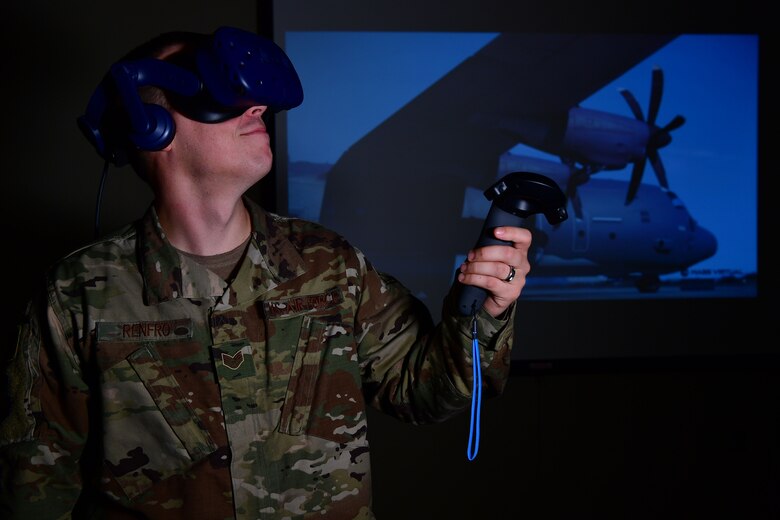The Air Force is committed to world-class training for Airmen by preventing stagnation in education through constant innovation to meet the needs of a new generation through a continuum of learning.
Headquarters Air Force, Air Mobility Command, and Air Education and Training Command have been working on a virtual-reality platform for maintenance training through Mass Virtual, a contractor that scans real-world objects to create virtual environments.
The C-130 enterprise established a working group with airlift wings from Little Rock Air Force Base; Dyess AFB, Texas; Yokota Air Base, Japan; and Ramstein Air Base, Germany; in order to collaborate and eliminate duplication of effort while crafting a VR platform focused on visualizing the ins-and-outs of the C-130H Hercules and C-130J Super Hercules to benefit maintenance Airmen.
"We pulled together with other wings to develop work tasks that would be most beneficial to invest in for Airmen - allowing us to establish a VR platform with a focus on the C-130," said Master Sgt. Nicholas Massingill, 19th Maintenance Group development and instructor section chief.
With a tentative completion date of summer 2020, Massingill hopes VR maintenance training will bridge the gap for new Airmen joining the Air Force in a technology-oriented system and speed up training while controlling the environment to safely and effectively train on mission-essential tasks.
"The new generation learns using technology, so incorporating VR will appeal to their learning styles," said Master Sgt. Gary Armstrong, 19th MXG maintenance training management section chief. "VR will help Airmen learn tasks quicker by transitioning to the 21st century of mainstream technology."
The current training system requires constant preparation and coordination to ensure a C-130 is available on the flightline the day training occurs. VR will replace the need to coordinate for weeks, or even months in advance, to get a small window of time with an aircraft for mandatory maintenance training.
"We request an aircraft to be down three days a week in order to train our students," Massingill said. "When we do that, we are taking aircraft away from the mission. While VR will never replace hands-on training, it will help bring familiarization to the task, so the instructors can speed up the process when conducting hands-on training."
Initially, each VR unit will have a virtual hangar where the trainee can complete one of five tasks. Among the tasks, which are based on necessities and pre-established training opportunities, are propeller, tire and brake replacement. Little Rock AFB's mission partners from the 314th Airlift Wing and 189th AW were also included in the working group, scanning and establishing a virtual hangar with tasks for the C-130H.
Nearly 230 maintenance Airmen across the 19th MXG will receive training through the new VR system annually - empowering Airmen by removing barriers, accepting risk and rapidly learning from productive challenges in a cost-effective manner.
The VR workspace will initially be located in the 19th MXG maintenance training section, which will also be utilized by mission partners at the 314th AW, with plans to eventually have dedicated rooms in the work centers as well.
"We could potentially see this in the work centers, providing Airmen who are feeling a bit rusty with an opportunity to run through the program a couple times before going out to perform the job," Massingill said.
This use of technology emphasizes AMC's objective to reinforce the value of maintenance Airmen and efforts to improve efficiency in training while retaining our technological edge to prevail in high-end combat.
"When we are teaching tasks, we are teaching proficiency," Armstrong said. "The only way you gain proficiency is by doing it over and over, that's how you get instinctual mechanical skills. Being able to use this virtual environment shows the possibilities are limitless."

Staff Sgt. Kenneth Renfrow, 19th Maintenance Group maintenance qualifications training instructor, uses a virtual reality headset at Little Rock Air Force Base, Ark., Dec. 19, 2019. Initially, each VR unit will have a virtual hangar where the trainee can complete one of five tasks. Among the tasks, which are based on necessities and pre-established training opportunities, are propeller, tire and brake replacement. (U.S. Air Force photo by Airman 1st Class Aaron Irvin)

Jesse Matos, a Mass Virtual team member, and Thomas Torbert, Air Mobility Command logistic management specialist, scan the flight deck of a C-130J Super Hercules to design a virtual-reality environment to train C-130 maintainers at Little Rock Air Force Base, Ark., Nov. 7, 2019. Nearly 230 maintenance Airmen across the 19th Air Wing will receive training through the new VR system annually. (U.S. Air Force courtesy photo)






